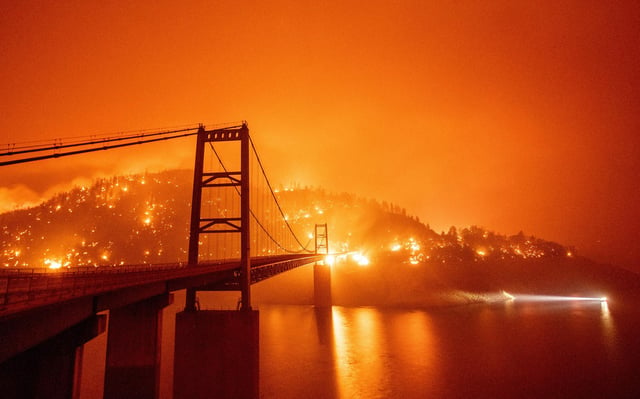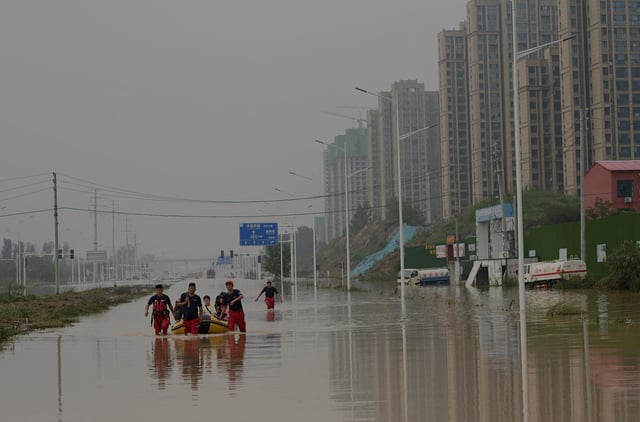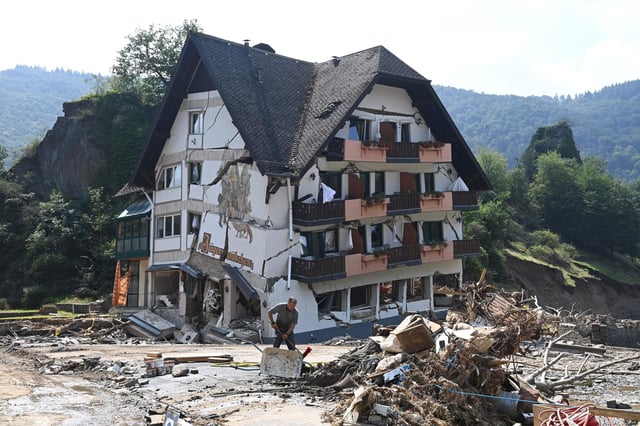We now have less than 100 days to go until the UN climate summit, Cop26, arrives in Glasgow.
By Anne Callaghan And Erica Mason
Sunday, 25th July 2021
THE SCOTSMAN
Five years on from the Paris Agreement, and with countless evidence that the climate crisis is worsening, the negotiations will focus on nationally determined contributions to stop the world from warming above 1.5 degrees.
The onus is on richer countries in the Global North to shoulder the heaviest burden of emissions cuts while supporting countries in the Global South who are being hardest hit by climate change.
On Friday, Scotland published its climate targets and plans in an ‘indicative Nationally Determined Contribution (iNDC)’. This is the first time a devolved government, city, or region has presented its plans in the format required of nation state parties to the Paris Agreement ‒ and demonstrates a commitment from Scotland to do its part in a global crisis.
To drive up ambition, other nations similar to Scotland ‒ who cannot formally sign up to UN climate agreements ‒ could follow Scotland’s lead and submit similar plans ahead of future climate change talks.
But how do the commitments in Scotland's iNDC measure up against the action that we need? In 2019, Scotland set some of the most ambitious climate targets in the world, pledging by 2030 to cut greenhouse gas emissions by 75 per cent.
Meeting these goals requires urgent and significant changes to any ‘business as usual’ approach. Earlier this year, the Cabinet Secretary for Net Zero, Energy and Transport, Michael Matheson, made this clear when he announced that Scotland had missed its climate emissions targets for the last three years and ordered a catch-up report to be delivered within six months.

Five years on from the Paris Agreement, and with countless evidence that the climate crisis is worsening, the negotiations will focus on nationally determined contributions to stop the world from warming above 1.5 degrees.
The onus is on richer countries in the Global North to shoulder the heaviest burden of emissions cuts while supporting countries in the Global South who are being hardest hit by climate change.
On Friday, Scotland published its climate targets and plans in an ‘indicative Nationally Determined Contribution (iNDC)’. This is the first time a devolved government, city, or region has presented its plans in the format required of nation state parties to the Paris Agreement ‒ and demonstrates a commitment from Scotland to do its part in a global crisis.
To drive up ambition, other nations similar to Scotland ‒ who cannot formally sign up to UN climate agreements ‒ could follow Scotland’s lead and submit similar plans ahead of future climate change talks.
But how do the commitments in Scotland's iNDC measure up against the action that we need? In 2019, Scotland set some of the most ambitious climate targets in the world, pledging by 2030 to cut greenhouse gas emissions by 75 per cent.
Meeting these goals requires urgent and significant changes to any ‘business as usual’ approach. Earlier this year, the Cabinet Secretary for Net Zero, Energy and Transport, Michael Matheson, made this clear when he announced that Scotland had missed its climate emissions targets for the last three years and ordered a catch-up report to be delivered within six months.

Wildfires rage around Lake Oroville, California, in September last year (Picture: Josh Edelson/AFP via Getty Images)
With the reality of a fundamentally altered climate hitting ever closer to home, even in the relatively sheltered Global North, it is simply not acceptable that Scotland has missed the last three years of targets.
Nor is it acceptable that the recently updated Climate Change Plan submitted to the Scottish Parliament and mandated by the 2019 Scottish Climate Change Act, lacks a credible plan to show exactly how Scotland will achieve its 75 per cent emissions reduction target by 2030.
Much more needs to be done ‒ urgently ‒ for Scotland to be a world leader on climate change. The people of Scotland have been demanding action: 68 per cent of adults agreed in one poll that climate change is an immediate and urgent problem. Young people in Scotland ‒ whose futures are at stake ‒ have been at the forefront of that movement.
One start would be to integrate the 166 recommendations made by a number of Scottish parliamentary committees to strengthen the Climate Change Plan update.
With the reality of a fundamentally altered climate hitting ever closer to home, even in the relatively sheltered Global North, it is simply not acceptable that Scotland has missed the last three years of targets.
Nor is it acceptable that the recently updated Climate Change Plan submitted to the Scottish Parliament and mandated by the 2019 Scottish Climate Change Act, lacks a credible plan to show exactly how Scotland will achieve its 75 per cent emissions reduction target by 2030.
Much more needs to be done ‒ urgently ‒ for Scotland to be a world leader on climate change. The people of Scotland have been demanding action: 68 per cent of adults agreed in one poll that climate change is an immediate and urgent problem. Young people in Scotland ‒ whose futures are at stake ‒ have been at the forefront of that movement.
One start would be to integrate the 166 recommendations made by a number of Scottish parliamentary committees to strengthen the Climate Change Plan update.

Rescue workers in Zhengzhou, China, move through floods that claimed the lives of at least 33 people last week (Photo by Noel Celis / AFP) (Photo by NOEL CELIS/AFP via Getty Images)
From extreme heatwaves and wildfires, to catastrophic flooding around the world, the climate crisis is having a devastating impact on livelihoods and nature. We must take stronger, faster action in Scotland to phase out our most polluting activities and create new, decent job opportunities in green industries.
And, amid a nature emergency, we must invest in proven practices to foster healthy ecosystems and enhance biodiversity: protecting peatlands, native woodlands and marine habitats. Addressing the two crises ‒ nature and climate as one ‒ can lead to reduced carbon emissions and increased resilience.
Additionally, Stop Climate Chaos Scotland proposed giving more attention to climate justice – helping to support those most impacted by climate change, in recognition of Scotland's responsibility for their fair share of the climate crisis.
Rich countries committed to providing $100 billion a year by 2020 to help those countries who have done the least to cause climate change to retool their economies and societies, as well as provide money to help communities adapt, survive and thrive beyond the impact of climate change already happening. That commitment is far off track, particularly on funding to help countries adapt.

From extreme heatwaves and wildfires, to catastrophic flooding around the world, the climate crisis is having a devastating impact on livelihoods and nature. We must take stronger, faster action in Scotland to phase out our most polluting activities and create new, decent job opportunities in green industries.
And, amid a nature emergency, we must invest in proven practices to foster healthy ecosystems and enhance biodiversity: protecting peatlands, native woodlands and marine habitats. Addressing the two crises ‒ nature and climate as one ‒ can lead to reduced carbon emissions and increased resilience.
Additionally, Stop Climate Chaos Scotland proposed giving more attention to climate justice – helping to support those most impacted by climate change, in recognition of Scotland's responsibility for their fair share of the climate crisis.
Rich countries committed to providing $100 billion a year by 2020 to help those countries who have done the least to cause climate change to retool their economies and societies, as well as provide money to help communities adapt, survive and thrive beyond the impact of climate change already happening. That commitment is far off track, particularly on funding to help countries adapt.

A country guest house in Laach, Germany, was among many building severely damaged by floods that killed more than 200 people in western Europe this month (Picture: Christof Stache/AFP via Getty Images)
There is also a need to secure additional money to cover the loss and damage created by irreversible climate impacts on land, culture and people.
Positively, the Scottish government announced this year that it would double the budget – to £24 million over the next four years – of its world-first Climate Justice Fund which was set up in 2012 after the Paris climate talks.
One major success of the fund has been the Climate Challenge Programme Malawi which has helped 42,000 people, the majority of them women and girls, in Southern Malawi to improve their access to food, water and energy so they are better prepared for climate-related disasters.
As Cop26 approaches, the Scottish government will be working with Stop Climate Chaos Scotland to listen to experts from the Global South on issues like climate finance, adaptation, loss and damage, and just transition. The success of the Cop26 negotiations in Glasgow depends on progress on these key issues and Scotland can play a key amplification role on those issues of concern.
In November, the world’s eyes will be on Glasgow. While the UK is the official host to the summit, the Scottish government has shown with the publication of the iNDC, that they, too, have something to add to the dialogue.
But as the countries confer with each other, it will be the people of the world who have the most to say: we need action, we need more of it, and we need it now.
Written on behalf of Stop Climate Chaos Scotland by Anne Callaghan, policy officer at anti-poverty charity SCIAF, and Erica Mason, policy campaigns officer at RSPB Scotland
If you’d like to read more about what Stop Climate Chaos Scotland are calling for, go to stopclimatechaos.scot/policy, or add your voice and share why you care at climatescotland.org
There is also a need to secure additional money to cover the loss and damage created by irreversible climate impacts on land, culture and people.
Positively, the Scottish government announced this year that it would double the budget – to £24 million over the next four years – of its world-first Climate Justice Fund which was set up in 2012 after the Paris climate talks.
One major success of the fund has been the Climate Challenge Programme Malawi which has helped 42,000 people, the majority of them women and girls, in Southern Malawi to improve their access to food, water and energy so they are better prepared for climate-related disasters.
As Cop26 approaches, the Scottish government will be working with Stop Climate Chaos Scotland to listen to experts from the Global South on issues like climate finance, adaptation, loss and damage, and just transition. The success of the Cop26 negotiations in Glasgow depends on progress on these key issues and Scotland can play a key amplification role on those issues of concern.
In November, the world’s eyes will be on Glasgow. While the UK is the official host to the summit, the Scottish government has shown with the publication of the iNDC, that they, too, have something to add to the dialogue.
But as the countries confer with each other, it will be the people of the world who have the most to say: we need action, we need more of it, and we need it now.
Written on behalf of Stop Climate Chaos Scotland by Anne Callaghan, policy officer at anti-poverty charity SCIAF, and Erica Mason, policy campaigns officer at RSPB Scotland
If you’d like to read more about what Stop Climate Chaos Scotland are calling for, go to stopclimatechaos.scot/policy, or add your voice and share why you care at climatescotland.org
No comments:
Post a Comment